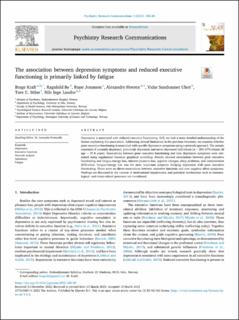| dc.contributor.author | Kraft, Brage | |
| dc.contributor.author | Bø, Ragnhild | |
| dc.contributor.author | Jonassen, Rune | |
| dc.contributor.author | Heeren, Alexandre | |
| dc.contributor.author | Ulset, Vidar Sandsaunet | |
| dc.contributor.author | Stiles, Tore Charles | |
| dc.contributor.author | Landrø, Nils Inge | |
| dc.date.accessioned | 2023-08-29T11:13:06Z | |
| dc.date.available | 2023-08-29T11:13:06Z | |
| dc.date.created | 2023-04-12T09:35:23Z | |
| dc.date.issued | 2023 | |
| dc.identifier.citation | Psychiatry Research Communications. 2023, 3 (2), . | en_US |
| dc.identifier.issn | 2772-5987 | |
| dc.identifier.uri | https://hdl.handle.net/11250/3086178 | |
| dc.description.abstract | Depression is associated with reduced executive functioning. Still, we lack a more detailed understanding of the factors explaining this association. Addressing several limitations in the previous literature, we examine whether poor executive functioning is associated with specific depression symptoms using a network approach. The sample consisted of currently depressed, previously depressed, and never-depressed individuals (n ¼ 289; 67% female; M age ¼ 37.4 years). Associations between poor executive functioning and nine depression symptoms were estimated using regularized Gaussian graphical modelling. Results showed associations between poor executive functioning and fatigue/energy loss, interest/pleasure loss, appetite changes, sleep problems, and concentration difficulties. Fatigue/energy loss was the most important symptom bridging depression with poor executive functioning. There were no direct associations between executive functions and core negative affect symptoms. Findings are discussed in the context of motivational impairments, and potential mechanisms such as immunological- and stress-related processes are considered. | en_US |
| dc.language.iso | eng | en_US |
| dc.rights | Attribution-NonCommercial-NoDerivatives 4.0 Internasjonal | * |
| dc.rights.uri | http://creativecommons.org/licenses/by-nc-nd/4.0/deed.no | * |
| dc.title | The association between depression symptoms and reduced executive functioning is primarily linked by fatigue | en_US |
| dc.type | Peer reviewed | en_US |
| dc.type | Journal article | en_US |
| dc.description.version | publishedVersion | en_US |
| cristin.ispublished | true | |
| cristin.fulltext | original | |
| cristin.qualitycode | 1 | |
| dc.identifier.doi | 10.1016/j.psycom.2023.100120 | |
| dc.identifier.cristin | 2140158 | |
| dc.source.journal | Psychiatry Research Communications | en_US |
| dc.source.volume | 3 | en_US |
| dc.source.issue | 2 | en_US |
| dc.source.pagenumber | 9 | en_US |

